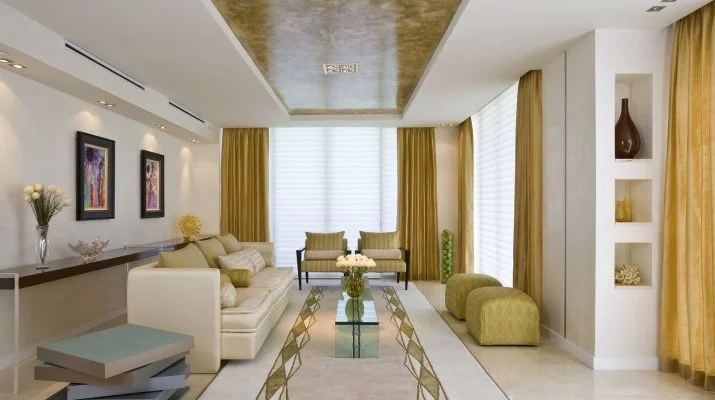Best Interior Design Hacks for Small Spaces

Strong 8k brings an ultra-HD IPTV experience to your living room and your pocket.
When living in a compact home or apartment, it can often feel like you’re playing Tetris with your furniture, trying to make everything fit without feeling cramped. Luckily, with a few smart strategies and expert insights, small spaces can be just as stylish, functional, and comfortable as larger ones. If you're searching for the Best Interior Design in Thanisandra, Singh's Interiors brings you tried-and-true design hacks to transform your small space into a beautifully efficient home.
1. Embrace Multi-Functional Furniture
One of the best investments you can make for a small home is multi-functional furniture. Think of ottomans with hidden storage, sofa beds, foldable dining tables, or coffee tables that double as work desks. These pieces help you maximize every inch of space without sacrificing comfort or aesthetics.
Pro tip: Look for furniture that can be easily moved around or stacked. Nesting tables or folding chairs are perfect for entertaining guests without taking up permanent space.
2. Use Mirrors to Expand Visual Space
Mirrors are a designer's secret weapon for small spaces. They reflect light and create the illusion of depth, making any room appear larger than it is. Place a large mirror opposite a window to maximize natural light, or use mirrored furniture to keep the look sleek and modern.
Bonus hack: A mirrored wall or floor-to-ceiling mirror in narrow hallways can instantly open up the area and make it feel more spacious.
3. Vertical Storage Is Your Best Friend
When floor space is limited, think vertically. Use tall bookshelves, wall-mounted cabinets, or floating shelves to store items without cluttering the room. In the kitchen, install hanging racks for pots and pans. In the bedroom, consider vertical wardrobes with built-in drawers.
This approach draws the eye upward and emphasizes height, giving the impression of a taller, roomier space.
4. Light Colors and Strategic Lighting
Light, neutral colors like white, beige, or soft gray can open up a room and reflect light better than darker shades. Use these tones for walls, ceilings, and large furniture to keep things airy. Add pops of color through artwork, cushions, or rugs.
Also, pay close attention to lighting. A well-lit room looks bigger and more inviting. Instead of relying on one overhead light, layer your lighting with:
- Wall sconces
- Floor lamps
- Under-cabinet lights
- Pendant lights over tables or counters
5. Keep It Clutter-Free
In small homes, clutter becomes noticeable very quickly. Prioritize minimalism by keeping surfaces clear and storing items out of sight. Adopt a “one-in, one-out” rule—if you buy something new, remove something old.
Organizers, baskets, and drawer dividers can help you maintain this system. Remember, open space feels like added square footage.
6. Sliding Doors Over Swinging Ones
Traditional hinged doors take up precious space when they swing open. Replace them with sliding doors or pocket doors to free up floor space. This hack works wonderfully for bedrooms, bathrooms, and even wardrobes.
Glass sliding doors between rooms also allow natural light to travel through the space, making it feel less compartmentalized.
7. Zone Your Space Creatively
In open-plan or studio apartments, use rugs, curtains, or shelving units to define zones without building walls. A simple area rug under your dining table or a bookcase between your bed and sofa can create the illusion of distinct rooms.
Zoning helps your space feel organized and gives each area a clear function, which is essential when you're working with limited square footage.
8. Go Custom with Built-Ins
Off-the-shelf furniture often doesn’t make the best use of unique layouts or corners. Custom-built furniture, while a bit more expensive upfront, pays off by perfectly fitting your space and your needs.
Consider built-in seating with hidden storage, wall-to-wall wardrobes, or custom kitchen cabinets that stretch to the ceiling. These solutions reduce dead space and offer maximum utility.
9. Use Transparent or Open-Frame Furniture
Transparent materials like acrylic or glass help furniture "disappear" visually, making a room look less crowded. Similarly, open-frame pieces—like a chair with slim legs or a floating TV stand—don’t block sightlines and keep the space airy.
It’s all about tricking the eye into seeing more openness than there really is.
10. Maximize Under-Used Spaces
Don’t ignore those awkward spots under stairs, windows, or beds. These areas can become valuable storage or work zones with a little creativity.
- Install drawers or rolling bins under your bed
- Create a reading nook under a window
- Use the space under your stairs for shelves, a mini office, or even a compact powder room
- No square inch should be wasted.
11. Wall-Mounted Desks and Foldable Tables
Need a workspace but don’t have an extra room? Wall-mounted desks or fold-out tables are brilliant additions. You can tuck them away when not in use, keeping the area open for other activities.
Pair it with a foldable chair or a compact stool that fits neatly underneath.
12. Smart Use of Curtains
Hang curtains from ceiling to floor—even if your windows are small. This creates the illusion of height and makes your room feel grander. Choose light, flowing fabrics to keep things soft and breezy.
Bonus idea: Use curtains as dividers in studio apartments to section off sleeping areas or closets.
13. Keep Flooring Consistent
Changing flooring between rooms can chop up a small space visually. Using the same flooring throughout your home—especially light wood or polished concrete—can make everything feel more connected and spacious.
If you want variation, try rugs instead of changing the flooring entirely.
14. Use Statement Pieces Sparingly
Too many small furniture pieces can make a room feel cluttered. Instead, go for a few well-chosen statement items—like a bold sofa or an oversized lamp—to add personality without overcrowding.
Statement pieces can also act as focal points, drawing attention and giving the room a design identity.
15. Reflect Your Personality
Finally, a small space should still reflect you. Use art, textures, and color schemes that make you feel at home. Compact living is all about smart choices, but it shouldn’t be boring. Just keep the balance between style and function, and you'll create a space that’s both beautiful and livable.
Conclusion
Small spaces offer a unique opportunity to be intentional with every design choice. By using smart layouts, choosing the right furniture, and paying attention to lighting and color, you can make a small home feel expansive, cozy, and elegant. Whether you’re in a compact studio apartment or a cozy 2BHK in the city, these interior design hacks can make all the difference.
For those looking for professional help and the Best Interior Design in Thanisandra, Singh's Interiors has the expertise and creativity to bring your small space to life. Their team understands how to turn constraints into design triumphs, delivering personalized solutions that match your lifestyle and budget.
Note: IndiBlogHub features both user-submitted and editorial content. We do not verify third-party contributions. Read our Disclaimer and Privacy Policyfor details.







